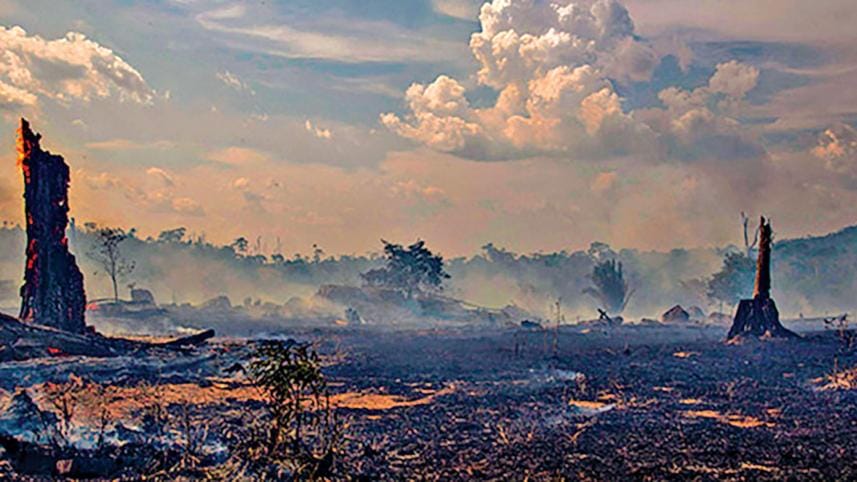Understanding the concept of ecocide

Recent proposed definition of ecocide by Stop Ecocide Foundation to be included in Rome Statue as a fifth core crime along with the crime of genocide, war crimes, crimes against humanity, and the crime of aggression has aroused both academic and policy debates all over the world. While the very concept of "ecocide" has become popular lately, the term was first coined in 1970 by Arthur Galston, an American biologist, at the Conference on War and National Responsibility. Galson used the term 'ecocide' to raise concerns on the excessive use of the defoliant Agent Orange which was used to inflict harms upon environment during the Vietnam War.
The word ecocide origins from the Greek word oikos which means home, and the Latin word caedere means an act of killing or demolishing. Hence, the term 'ecocide' simply stands for "killing our home". Independent Expert Panel's recent definition of ecocide stands as "unlawful or wanton acts committed with knowledge that there is a substantial likelihood of severe and either widespread or long-term damage to the environment being caused by those acts" in the proposed Article 8 ter. Here the word "wanton" has been explained as "reckless disregard" in order to consider an act to be ecocide. Such reckless act that would eventually cause "serious adverse changes, disruption or harm to any element of the environment" and such harm would have to "extend beyond a limited geographic area, cross state boundaries, or [be] suffered by an entire ecosystem or species or a large number of human beings". The proposed article also states that damage caused from the crime of ecocide needs to be "irreversible or unable to be fixed within a reasonable period of time". And for the purpose of the application of the Article 8 ter, the word "environment" has been defined as an inclusive of "the earth, its biosphere, cryosphere, lithosphere, hydrosphere and atmosphere, as well as outer space".
Unlike genocide, the panel definition of ecocide has been provided without having the requirement of mens rea or specific intent and thereby divulging itself as a strict liability offence. The rationale behind the proposal of ecocide as a strict liability offence is that environmental harm usually happens to be an indirect result of productivity, and hence establishing direct intention is hardly possible when it comes to environmental harm. Here, it can be said that the term ecocide has been used to depict the seriousness of environmental harm and its devastating impact on our mother earth by establishing that environmental harm on a massive scale should no longer be subject to proving some elements. However, it should be noted that the crime of ecocide mainly focuses on massive destruction of environment and does not necessarily include the small ones.
Albeit the proposed definition of ecocide for criminalising the act of ecological massive destruction seems a viable solution to protect our ecosystem, also recognising the implementation of such proposal might face some difficulties and challenges. For instance, some argue that the requirement of knowledge (in wanton acts) in determining whether one's act will cause excessive damage to the environment in relation to the anticipated socio-economic developments is almost impossible to prove and will create evidentiary hurdles. Another challenge would be the ICC's burden with large number of cases unless there is a specific forum to deal with ecocide cases only. Also, the cases on the crime of ecocide would have to be brought against individuals representing the corporations or against the states where the activities of the corporation are based since the corporations would not be held liable directly under the Rome statute. And that will undoubtedly bring strong opposition to the inclusion of ecocide as an international crime given the strong economic interests involved within these corporations.
Apart from that, aligning ecocide with International Environmental law (IEL) would be a stumbling block since criminal law focuses on the requirement of precision and foreseeability while environmental law requires "balancing and trade-offs with few hard and clear prohibitions". Last but not least, some commentators identify that since the proposed definition takes an attempt to balance the socio-economic interests with environmental harm, the term 'ecocide' itself is not eco-centric and therefore "not ecocide" at all. However, some may find it surprising, the IEL itself is not purely eco-centric rather is an approach that motivates humans to adopt environmental protections by enabling environmental law progression.
Needless to say that, in spite of having some challenges, the proposed crime of ecocide suggests a plausible solution to protect our planet by making polluters criminally liable in case of massive destruction to the ecosystem. It brings seriousness to our understanding of nature, reminds us that the earth is our home, and we need to adopt viable measures to protect it. The crime of ecocide also conveys the gravity of environmental harm, the urgency to reduce massive destruction caused to the environment, and therefore urges that such an act of massive destruction to environment should no longer be considered as "second class crime". Finally, it once again reiterates that protecting our environment means protecting ourselves. Hence, it warrants serious commitment from the international community as a whole.
The writer is student of law, University of Dhaka.



 For all latest news, follow The Daily Star's Google News channel.
For all latest news, follow The Daily Star's Google News channel.
Comments